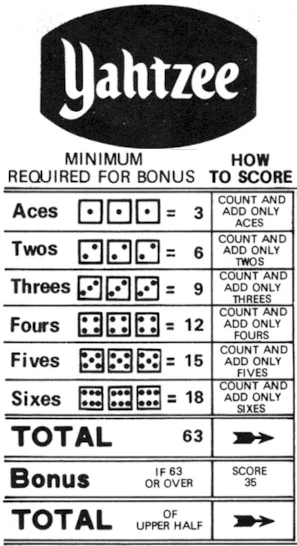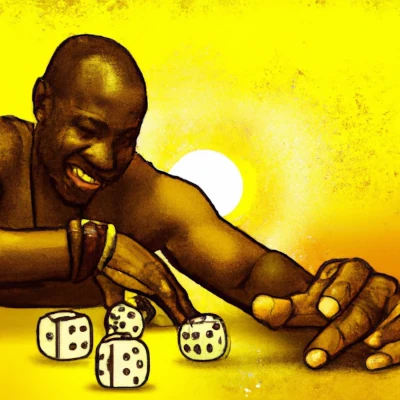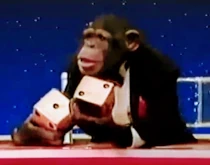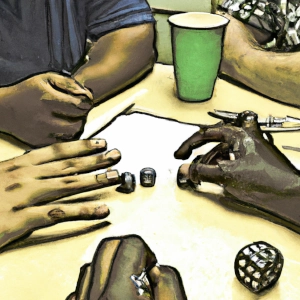The Top 5 Yahtzee Mistakes
Everyone wants to know how to win in Yahtzee. But there are common errors that many players make during a game which can negatively impact their final score. Whether it’s unsound tactics, misguided scoring techniques, or an unfocused mind, don’t stumble into these familiar pitfalls. The Yahtzee Manifesto presents these pro-tips to help improve your game. Learn the top five Yahtzee mistakes to avoid and you’ll be on your way to dice success!

Don’t Underestimate the Upper Section

The Lower Section of a Yahtzee score card may contain some heavy hitters like the Yahtzee and Large Straight, but the Upper Section is a points powerhouse that must not be overlooked. Scoring an average of three for each number in the Upper Section triggers a bonus but the regular points generated from the One through Six categories really add up.
The Upper Section Bonus is often underestimated since it only adds 35 points to the total score, which may seem trivial if you’re targeting a 100-point Yahtzee Bonus. However, a solid Upper Section can make all the significant difference in the outcome of the game. The Fours, Fives, and Sixes categories are particularity strong because rolling one extra number can really pad your score. But even the lower numbers can play a vital role. If you are on par for the bonus with only Ones and Twos remaining, a fourth Two will relieve the serious pressure of rolling three Ones. While Ones are often considered a throw-away category for a poor roll, a Yahtzee game can be decided by only a single digit.
The power of the Upper Section can be exemplified in dramatic fashion through advanced tactics like the the Joker’s Gambit. This crafty maneuver passes up a rolled Yahtzee and actually yields more points by scoring the five-of-a-kind in the Upper Section. It only works if the Yahtzee is rolled in Fives or Sixes but if the timing is right, it can be a classy way to summon the full force of the scorecard’s Upper Section.
The Yahtzee – and subsequent Yahtzee Bonuses – will always be the only way to achieve record high scores. The Upper Section Bonus will usually come naturally when you roll multiple Yahtzees. But those types of a games are rare. A player can’t rely on sheer luck to succeed at Yahtzee. So careful attention should always be paid to the score card’s Upper Section and the avalanche of points that it can provide.
A sure sign of underestimating the power of the 35-point Upper Section Bonus is to give in to the temptation of scoring an easy target the Lower Section when you still have rolls in hand. And one of the easiest and most overused of these combinations is the Full House.

Don’t Score the Full House Too Early

Pure hatred is too ugly a concept to be found in Yahtzee, a game defined by love and acceptance. But negative thoughts sometimes do arise. And more often than not these spiteful feelings are directed at one scoring category in particular. Because like a mid-afternoon high ball, no other Yahtzee combination will toy with your emotions and blur your judgment like the dreaded Full House.
The Full House seems to show up more frequently than any other scoring category. And it’s not just anecdotal - Yahtzee statistics back this up. Using a near-optimal strategy a player will successfully score the Full House in over 90% of games, making it one of the easiest combinations to roll. It comes easy and comes back often, causing many to consider it both the best and the worst thing on a Yahtzee score card.
It you’ve rolled a Full House, you’re by definition also staring at three of a kind. If there is a corresponding opening in the Upper Section, first consider scoring it there. You can kill two birds with one stone by passing on a premature Full House while padding the Upper Section. Take the Full House early you risk denying yourself the opportunity to lock down the all-important 35-point bonus.
When the Upper Section looks secured or if you are pressing for maximum points, try converting that Full House into a higher scoring combination in the Lower Section. If you have additional rolls at your disposal, who knows what may be in store? Turning three Fives or Sixes into a fat Four-of-a-Kind can yield additional points. And never lose sight of the potential Yahtzee lurking within an early Full House. After all, you’re already more than halfway there. So go ahead and roll again and see what happens - it is the game of chance after all!
Don’t make the mistake of scoring a Full House too early in a game. Chances are, you’ll roll several more before all is said and done. And unless the situation is dire, it is rarely advantageous to actively try to roll it. There is a famous saying in Yahtzee – “Let the Fully come to you.”
A player can study their scoring strategy in greater detail using a customized algorithm known as the Full House Dis (FHD) quotient. Use the FHD to analyze your tactics and determine if you need to tweak your approach:
FH(d2) - f
FH = 1, if you successfully score 25 points for Full House
FH = 0, if you score 0 points for Full House
d = number of Full House disses (rolling a Full House but not scoring it)
f = number of additional Full Houses after scoring a Full House
Mastery over the Full House will be represented by a high FHD. It increases exponentially every time you pass it up – so long as you do eventually score it. But if you take a zero and subsequently roll a few, you’ll be left with a negative number. Players are generally advised to repeatedly pass on the Full House until the last possible moment, a la your plan B prom date.
A player’s righteous disdain for the Full House can pose an ethical dilemma as these antagonistic feelings go against the peaceful philosophy of the game. To maintain a calm and relaxed demeanor at the dice table, it is important to know how best to deal with this paradox and avoid Full House mistakes. When it arrives early, especially on the first roll of a turn, ask yourself if you are really willing to sacrifice the ultimate Yahtzee dream by scoring the "Fool" House too soon.

Don’t Fill in the Wrong Scoring Category

Undervaluing the Upper Section and overvaluing the Full House are specific and widespread manifestations of a larger theme. These two most common mistakes are examples of a strategic error where a player records a mediocre score when they have a better choice available. Filling the wrong category on the score card can result in lost points and missed opportunities to increase the player's overall score. It's important to carefully evaluate all options before making a final decision of where to record a score.
Humans are fallible so the act of determining the best move in a game of Yahtzee is prone to mistakes. AI-powered aides can help develop optimal Yahtzee strategy in friendly games or solitaire, but are typically not permitted in competitive play. So it’s up to us to evaluate the score card effectively and determine the best course of action. There are several reasons why this is a challenge for players:
- Limited number of scoring categories: Yahtzee has only 13 categories to complete and each category can only be used once. This means that once a category is filled, the player must choose from the remaining categories, which may not always be the best option. If no category can be scored, you will have to take a zero somewhere. This can be a crucial decision that will influence the remainder of your game.
- Balancing short-term and long-term goals: Yahtzee doesn’t happen all at once. It requires players to balance their short-term and long-term goals. For example, if a player needs a Large Straight to score 40 points but also has Three-of-a-Kind open, they must decide whether to press on and try for the Large Straight, which has a lower probability, or take the safer option of filling in the Three-of-a-Kind category. It is important to be able to plan ahead to leave yourself the best chance to succeed both in the here and now and at the end of the game.
- Changing probabilities: The probability of rolling certain combinations changes with each roll. For example, if a player is going for a Small Straight, they may roll a few dice that could be used for a Full House or Three- of-a-Kind. The player must then decide whether to keep those dice and try for a different combination or re-roll them and try for the Small Straight. Should you change horses in mid-stream or adhere to your original intent?
A solid understand of Yahtzee rules and odds will help you to make right decisions. But chance is an inherent part of the game. Even when you know where you’d like to record a score, you’ll need to be ready to adapt those plans and the game state evolves.

Don’t Limit Your Opportunities

Yahtzee is a celebration of infinite diversity in infinite combinations. Just as the number of dice possibilities is nearly endless, so too are the strategic approaches to the game. One of the biggest mistakes in Yahtzee is when a player fails to adapt their strategy based on the current state of the game.
Like an early ape standing upright to reach some fruit, a successful Yahtzee player must learn to evolve in response to changing circumstances. Stubbornly clinging to outdated ideas can easily lead to tactical extinction. For example, a balanced score card where the Upper and Lower Section categories are kept in an equilibrium is often a primary goal. But life isn’t always so simple. If the circumstances dictate that you fully complete the Upper Section early on, you will have change your game plan to focus on filling in the Lower Section categories. A stubborn player may struggle to accept this new reality.
But every new obstacle becomes a fresh opportunity for success. It is important to adapt to changing circumstances because doing so can significantly impact your ability to win the game. As play progresses, the game state can change quickly. If you have been aiming for a specific scoring category, for instance, but the dice aren’t rolling your way, you may need to adjust your strategy and aim for a more achievable combination instead. Expand beyond your comfort zone and welcome new points possibilities.
Yahtzee is based on chance and skill, and while luck can play a role in the outcome of the game, players must also be able to adjust their plans and make strategic decisions in order to succeed. Whether you are deciding which dice to keep and which ones to re-roll or where to record a score, keep an open mind to all opportunities.
Tournament play presents even more demands, as players must focus on outscoring their opponents. As other players start to accumulate points, the pressure to roll higher-scoring combinations increases. If you do not adapt to this changing environment and continue to focus on lower-scoring combinations, you may fall behind and have little chance of catching up. Use that pressure as an opportunity to evolve your game.

Don’t Play Your Opponent’s Dice

When playing Yahtzee with other people, it can be tempting to adopt a win-at-all-costs approach. But the game is actually a battle against the dice, not against your opponent. By focusing too hard on how other players are doing, you risk becoming blind to your own game.
Yahtzee was originally designed to mimic several aspects of the card game Poker, including familiar scoring categories like Three-of-Kind, Full House, and the Straights. But such similarities are only skin deep. One of main strategical tenets of poker, for example, is to “play the opponent not the cards.” But attempting to adapt these tactics to Yahtzee would be a grave mistake.
A solid playing surface may be needed to roll the dice, but Yahtzee is truly played between the ears. The additional distractions that occur during a multiplayer game increase a player’s odds of making a strategic mistake. It is important to focus the mind so as not to succumb to trash talk or other forms of psychological intimidation. Rash play like rolling on a gut feeling when the odds are against you often spells trouble.
How to win a game of Yahtzee? While the object is clearly to get the most points, don’t worry about how the other players are doing. This is completely out of your control. Any time and energy you spend fretting over the competition will only serve to distract you from your ultimate goal. Focus on your own dice and play the probabilities that you are dealt.

